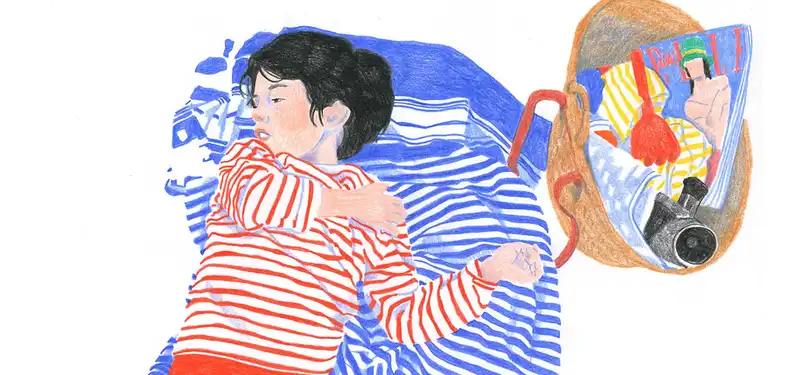Nov 3, 2024
2025 Oscar Short Film Candidates: -Summer 96 - Director Mathilde Bedouet
Welcome to the spotlight series of Cartoon Brew, which focuses on the 2025 Academy Award-nominated animated shorts. Films in this series have been certified on one of several routes, including winning an Oscar at a film festival, exhibiting in a theater or winning a Student Academy Award.
Today's film is the French director Mathilde Bédouet and producer l'heure d'été and Tita B Productions' Summer96 (Été96). The short film won its Academy Award qualification by winning the Cesar Award for animated Short films.
Summer 96, a rotoscoped2d animated short, the routine (and boring) mid-August picnics of Paul, his family, and their friends turn into a terrifying experience as they all find themselves trapped in the tide of Carlot Island, but Paul finds more about himself than he expected. You can also use the following methods: ***********
Cartoon Brewing: Summer 96 is dedicated to your parents. How did you feel to express them from the point of view of children-
Mathilde Bedouet: A lot of kindness and nostalgia for these characters Through this film, I wanted to convey how I felt when my child's perspective on his parents collapsed. It's an important moment to understand that as you grow up, your parents are imperfect and they don't always have all the answers to life's challenges.
What was it about this story or concept that forced me to connect with you and direct the film-
The story of this film was born from a box full of video camera cassettes I found in my father's basement. A treasure chest full of memories. At the time, shooting as an individual was expensive, and many shots were cut with a big leap from one era to another, so re-viewing them was very much on most of these tapes, and we saw a vacation in Brittany with this island in the background. I was very inspired by this footage in terms of energy, styling and detail. Despite the overall joy of the holiday, I remembered it also as a moment of solitude, a period of childhood in which we find ourselves between the two worlds. The child is not part of the world and one of the adults, either. It is when we realize that we can count on ourselves alone.
What did you learn through the experience of making this film, production-wise, filmmaking-wise, creative, or on the subject-
At the beginning of the process, I wanted to use these archives themselves in the film, but I thought it was my storytelling approach. I realized that it offers a limit to the team. I decided to keep the footage as a kind of guardian spirit while writing a new fiction deeply inspired by these videos. I not only shot the actors and the whole story, based on my memory, but also pushed the dramaturgy a bit more.
Another big realization was that my use of the rotoscope takes a very long time - more than 5,000 drawings. But when the film is redrawn, I'm sure that the actor's acting will bring a lot to the final emotion, so I still use this technique to project more.I've had a lot of fun through the production of the film. I loved going from a very pleasant, collective energy during filming to a more meditative and lonely period during the drawing phase. I also learned how important it is to be well surrounded and how lucky it is to have such a producer. Finally, the film is made up of the talent that each person brings to the project, and I think it's great to think that if someone goes missing, everything collapses.
Can you explain how you developed a visual approach to cinema - why did you settle for this style/technique-
I used rotoscope animation I wanted to use this process to capture all the humanity of the actors, their acting, their spontaneity, their voices. To draw the film, I chose a limited range of colors to create harmony in the whole story. Used a palette of bright colors with colored pencils reminiscent of holidays and childhood.
White also takes up a lot of space in the film; it's about wanting to talk about somehow forgotten memories, and therefore fragmented images. In that sense, using white allows viewers to project their memories into movies or off-screen space.
.



Post your comment